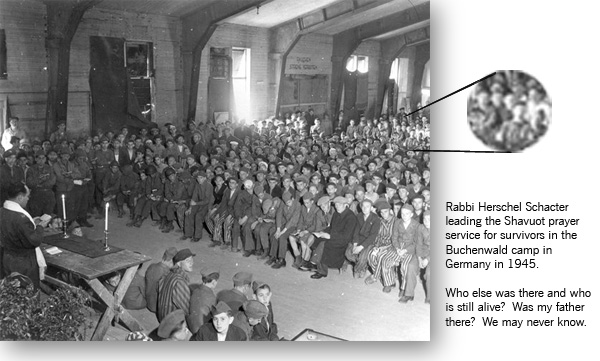Rabbi Herschel Schacter Is Dead at 95
Cried to the Jews of Buchenwald: ‘You Are Free’
Rabbi Schachter later said, the sting of smoke in his eyes, the smell of burning flesh and the hundreds of bodies strewn everywhere. My Dad, who was in the campo three days earlier, also wrote of the horrible stench in Buchenwald, comparing its horror to the feeling of love he felt smelling my mothers hair in bed. That letter is very hard to read. 
The Rabbi stayed n the camp for months, tending to survivors, leading religious services in a former Nazi recreation hall and eventually helping to resettle thousands of Jews. Amongst these was a child, Yisrael Meir Lau. Yisreael later became the chief rabbi of Israel.
MARGALIT FOX, in her obituary for Rabbi Schachter, tells us that “Rabbi Schacter said afterward, it seemed as though there was no one left alive. In the camp, he encountered a young American lieutenant who knew his way around.
“Are there any Jews alive here?” the rabbi asked him.
He was led to the Kleine Lager, or Little Camp, a smaller camp within the larger one. There, in filthy barracks, men lay on raw wooden planks stacked from floor to ceiling. They stared down at the rabbi, in his unfamiliar military uniform, with unmistakable fright.
“Shalom Aleichem, Yidden,” Rabbi Schacter cried in Yiddish, “ihr zint frei!” — “Peace be upon you, Jews, you are free!” He ran from barracks to barracks, repeating those words. He was joined by those Jews who could walk, until a stream of people swelled behind him.
As he passed a mound of corpses, Rabbi Schacter spied a flicker of movement. Drawing closer, he saw a small boy, Prisoner 17030, hiding in terror behind the mound.
“I was afraid of him,” the child would recall long afterward in an interview with The New York Times. “I knew all the uniforms of SS and Gestapo and Wehrmacht, and all of a sudden, a new kind of uniform. I thought, ‘A new kind of enemy.’ ”
With tears streaming down his face, Rabbi Schacter picked the boy up. “What’s your name, my child?” he asked in Yiddish.
“Lulek,” the child replied.
“How old are you?” the rabbi asked.
“What difference does it make?” Lulek, who was 7, said. “I’m older than you, anyway.”
“Why do you think you’re older?” Rabbi Schacter asked, smiling.
“Because you cry and laugh like a child,” Lulek replied. “I haven’t laughed in a long time, and I don’t even cry anymore. So which one of us is older?” 
At one of those services, Lulek and his older brother, Naftali, were able to say Kaddish for their parents, Polish Jews who had been killed by the Nazis. “
Lulek is now 76 and grew up to become the Ashkenazi chief Rabbi of Israel. Last March the Rabbi met with President Obama and said of Rabbi Schechter, “For me, he was alive,” Rabbi Lau said in an interview with The Times on Monday. “I speak about him with tears in my eyes.”
Rabbi Lulek is obviously one of the people who should know my fathers story and, if the feud with my brother Hugh is ever settled, Rabbi Lau is certainly a person I would want to contact.